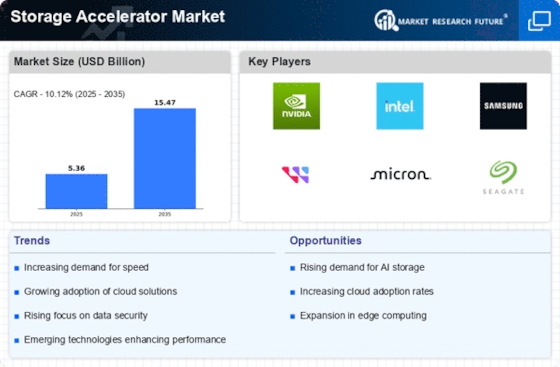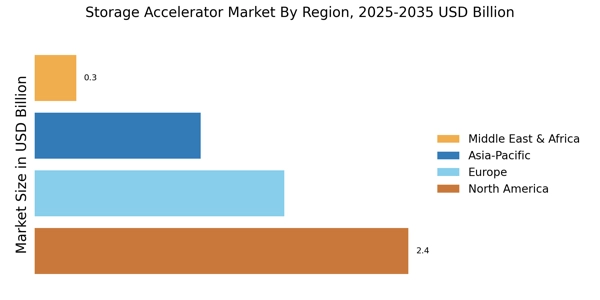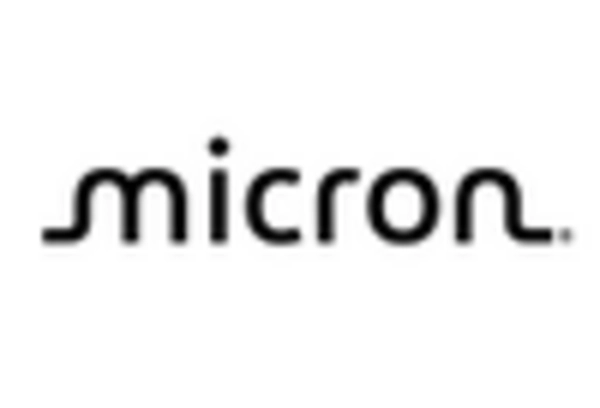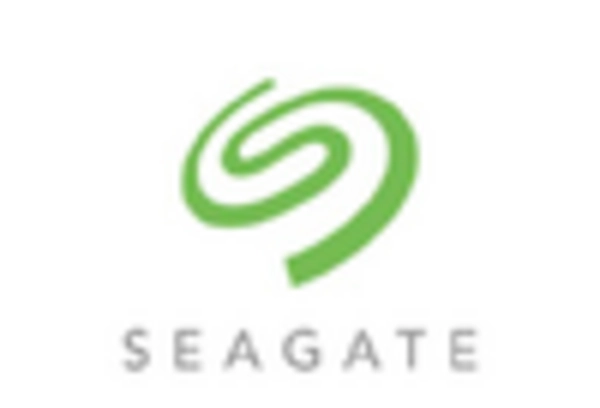Expansion of Cloud Services
The rapid expansion of cloud services is significantly influencing the Storage Accelerator Market. As businesses migrate to cloud-based infrastructures, the demand for efficient storage solutions that can handle large volumes of data is increasing. Cloud service providers are seeking storage accelerators to optimize performance and ensure seamless data access for their clients. Recent data indicates that the cloud storage market is expected to reach a valuation of over 200 billion dollars by 2026, highlighting the potential for storage accelerators to play a crucial role in this ecosystem. This trend not only enhances the performance of cloud applications but also drives the need for innovative storage solutions within the Storage Accelerator Market.
Emergence of Big Data Analytics
The emergence of big data analytics is reshaping the Storage Accelerator Market. Organizations are increasingly leveraging vast amounts of data to gain insights and drive decision-making processes. This trend necessitates the use of storage accelerators that can efficiently manage and process large datasets. The big data analytics market is projected to grow significantly, with estimates suggesting a compound annual growth rate of around 10% over the next several years. As businesses seek to harness the power of data analytics, the demand for storage solutions that can support high-speed data processing and retrieval is likely to escalate, thereby propelling growth in the Storage Accelerator Market.
Increased Focus on Data Security
In the current digital landscape, the increased focus on data security is a pivotal driver for the Storage Accelerator Market. Organizations are prioritizing the protection of sensitive information, leading to a demand for storage solutions that not only enhance performance but also ensure data integrity and security. The rise in cyber threats and data breaches has prompted businesses to invest in advanced storage technologies that incorporate robust security features. This trend is reflected in the growing market for secure storage solutions, which is expected to witness substantial growth in the coming years. As a result, storage accelerators that offer enhanced security measures are becoming increasingly vital in the Storage Accelerator Market.
Advancements in Storage Technologies
Advancements in storage technologies are significantly impacting the Storage Accelerator Market. Innovations such as NVMe (Non-Volatile Memory Express) and SSD (Solid State Drive) technologies are revolutionizing data storage and retrieval processes. These advancements enable faster data access and improved performance, which are critical for modern applications. The market for NVMe storage solutions is projected to grow at a remarkable pace, with estimates indicating a compound annual growth rate of over 20% in the next few years. As organizations seek to leverage these cutting-edge technologies, the demand for storage accelerators that can optimize performance and efficiency is likely to rise, further driving growth in the Storage Accelerator Market.
Growing Demand for High-Performance Computing
The Storage Accelerator Market is experiencing a surge in demand for high-performance computing solutions. As organizations increasingly rely on data-intensive applications, the need for faster data processing and retrieval becomes paramount. This trend is particularly evident in sectors such as finance, healthcare, and scientific research, where real-time data analysis is critical. According to recent estimates, the market for high-performance computing is projected to grow at a compound annual growth rate of over 7% through the next few years. Consequently, storage accelerators that enhance data throughput and reduce latency are becoming essential components in modern computing architectures, driving innovation and investment in the Storage Accelerator Market.
















